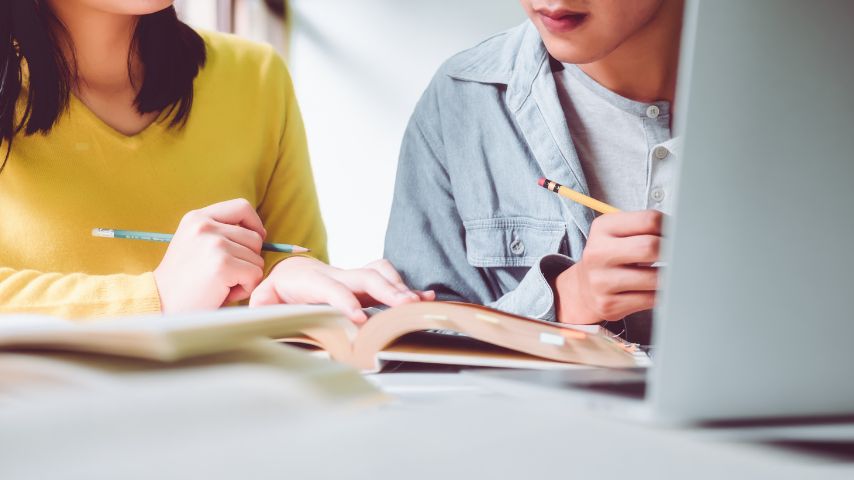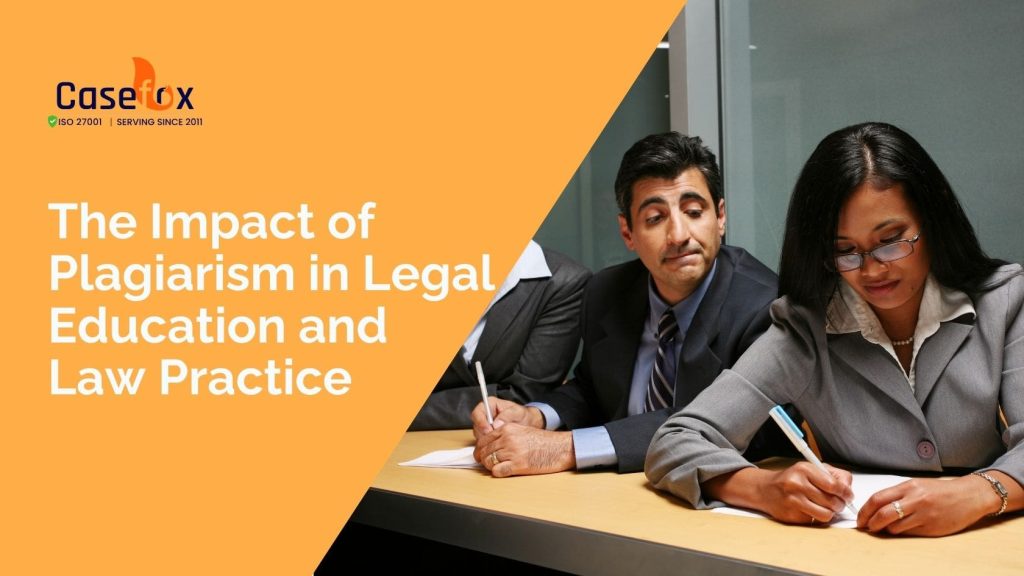Plagiarism has become a crucial issue in academics. As one of the most ethical disciplines, law education is no exception. In law, it harms scholarly integrity equally as it does in other fields. It can cause severe outcomes that may go beyond academic penalties.
Just like in education, it also has its effects on law practice. Whether a student pursuing studies or a practicing professional, you must be familiar with its impact on academics and career. Understanding whether plagiarism is against the law can help you remain safe from putting yourself in any unwanted problems. In this blog, we will discuss the consequences you may face regarding plagiarism in the practice of law. We will also be sharing how you can avoid plagiarism. However, before that, it is essential to understand what plagiarism is. So, let’s start with its basics to better appreciate its impact.
What Exactly Plagiarism Is?
Plagiarism refers to using the written work of reputed authors and pretending it is your own. Simply put, it involves stealing information from others without their consent and utilizing it for personal benefit without proper attribution. Writing a legal brief or a law assignment copying someone else’s work, such as sections from case studies, law research papers, or other resources, will be considered plagiarism.
Plagiarism in legal education can occur in multiple forms. Let’s look at the most common and prominent ones of them:
Direct Plagiarism: Direct plagiarism appears when you directly copy a large or small section from others’ work. It is an act of including word-by-word information from external sources without citing any of them.
Patchwork Plagiarism refers to accumulating multiple words, sections, or sentences to create a new text. It often occurs when you try to copy chunks from different sources and gather them in one place to make a complete yet different statement.
Self-Plagiarism: The resume of particular sections of already submitted work causes self-plagiarism. The main reason for its presence is repeating previously used details, facts, figures, or other data types in assignments.
Accidental or Unintentional Plagiarism: The most common plagiarism type in education, including law studies. It occurs when your written information unintentionally matches others. Although you don’t intend to do so, this unintentional resemblance is still considered plagiarism and has the same legal repercussions of plagiarism as others.
Paraphrasing Plagiarism: This type is caused by improper rephrasing of others’ material. When you reuse others’ content by changing a few words and rearranging some sentences, the rewritten content still falls under plagiarism. While writing a legal document if you paraphrase the content it will still be considered copied according to laws of plagiarism.
Outcomes of Plagiarism In Legal Education
Plagiarism has severe consequences in both intentional and unintentional attempts. As a law student, you must be familiar with them to avoid them. Here are some dire outcomes that you may have to face if you are caught plagiarizing your work:
Failing Grade On Assignment Or Course

Failing grades on assignments or courses is one of the most common penalties for plagiarism. Educators expect their students to submit uniquely created academic assignments, especially legal studies. They want learners to respect others’ time and effort in creating original work.
Plagiarizing content is one of the significant forms of educational misconduct in teachers’ eyes. They don’t tolerate any kind of compromise on the originality of the work. That’s why when you plagiarize your work, being a law student, you may have to face strict grading penalties from your professors.
Expulsion From The Institute
Rustication from college or university is another dire consequence of committing plagiarism in legal education. The worst situation can happen in your educational journey if you are caught plagiarizing your assignments. Remember, institutes have strict policies regarding academic misconduct, and plagiarizing the writing tasks is at the top.
Stealing someone else’s work is highly prohibited in the educational environment. Law students expected to obey the regulations more strictly may have higher chances of expulsion from the institute if found guilty of this offense. Depending on how severe the plagiarism is, they could receive a temporary or permanent suspension.
Academic Probation
Another penalty for plagiarizing your assignments is academic probation. While not as severe as expulsion or failing grades, probation can also impact the student’s educational journey. It serves as a warning and requires them to continue their studies under strict observation and restriction.
The probation acts as a mark on the reputation of learners in law education. When you copy others’ work intentionally and pass it as your own, you breach plagiarism rules. Being a student of legal education, this violation reflects you as intellectually honest, which lowers your value in front of teachers, institutions, and fellows.
Effects Of Plagiarism In Law Practice
Here are some main effects of plagiarism on the professional journey:
Risk Of Losing Professional License

A professional license is the backbone of a lawyer’s career. It allows them to fight against those violating laws and stand for justice. This license requires them to maintain the highest standards of honesty. It demands that they stop others from engaging in unethical activities and themselves from any misconduct.
However, when you commit plagiarism as a professional, it badly harms the integrity of the law profession. The court sees it strictly and can penalize you on different levels. The risk of losing a professional license is also among the legal penalties you may face.
Huge Damage To Reputation
As a lawyer, you might be familiar with the fact that reputation is everything in this profession. Success in this profession dramatically depends on the trust you build with your colleagues, clients, and especially the court. One incident of stealing others’ material can badly damage this trust and showcase you as professionally dishonest.
Whether reusing small sections or copying another lawyer’s work extensively, these practices can lower your credibility if caught. With a ruined professional image, attracting clients, building relationships with other lawyers, and regaining credibility in the court becomes harder.
If you are caught in a severe plagiarism case and it gets exposed publicly, this incident can destroy your reliability. In this situation, earning respect again can be more complex and time-consuming than before.
Legal Actions And Financial Fines
Written material is considered the intellectual property of the original author. That’s why using others’ material without permission violates intellectual property rights. As a lawyer, you may be familiar with the copyright laws and the penalties for their violations. So, if your documents contain plagiarism, you become susceptible to legal action for breaching copyright regulations.
The severity of the penalty may vary depending on the extent of plagiarism. For instance, if the violence is mild to moderate, you may be sentenced to lawsuits. In severe cases, such as regularly plagiarizing your legal briefs, engagement letter, legal drafting, and legal writing on a large scale, you may be asked to pay hefty fines.
So, in addition to lowering your reputation and creating the risk of losing your license, plagiarism can also put an extra burden on your pocket in the form of fines.
How To Avoid Plagiarism In The Law Field?
As you have learned how badly plagiarism can impact your studies and professional journey, you must avoid it at any cost. Here are some practices that will help you refrain from plagiarizing your work:
Commit To Stop Copying Others
The first thing you can do to avoid plagiarism is promise not to copy material from anyone. The commitment to do your work on your own allows you to create unique content. It helps you to take responsibility for your tasks and do them independently. So, if you want your writing tasks in both legal education and law practice to remain original, commit to stop copying others.
Whether it is an assignment, legal brief, or any other document, prepare it using your knowledge, opinion, and thoughts. If you need help in any academic writing or legal writing task, you research to take inspiration but ensure you don’t reuse someone’s statements without their permission. You need an understanding of plagiarism and copyright law while taking references for your legal writing.
This practice will help you create your material entirely and enhance your ability to produce original work. So, instead of relying on already-existing content, commit to being different and writing on your own, saving you from the impacts of legal plagiarism.
Use Online Plagiarism Checkers

An easy and most effective way to avoid plagiarism is to use online plagiarism checker tools. These digital tools allow you to ensure that no unintentional or accidental resemblance is present in your legal writing projects or academic writing tasks. They can help you save your reputation and protect you from other impacts of unintentional similarity.
Many plagiarism detectors are available online, but not all are efficient. However, in the abundance of such tools, the online plagiarism checker offered by Paraphraser.io stands out as a credible, fast, and accurate option. By uploading your content through this plagiarism checker free tool, you can determine the originality of your written material.
It dives deeper into text and compares your content with a vast database, including enormous resources related to the legal field. So, before submitting your assignment or legal document, pass it through this plagiarism detector to verify its originality.
Credit Original Authors
If you feel the need to borrow information from others, make sure you credit the original author. It is the best way to make fair use of others’ work. Using someone else’s content with proper attribution doesn’t fall under stealing information.
So, you must cite all the sources in scholarly and legal writing to avoid plagiarism. However, make sure that you practice citations per the institution’s or court’s requirements. For example, your institute or teacher may require you to cite the source in a particular style, such as MLA or APA.
Similarly, the legal citation method may vary in different regions. That’s why you should always use the citation style that is either commonly accepted by the respective authorities or meets the specific requirements. Otherwise, the borrowed material may still be considered plagiarism in both the academic and professional worlds. So make sure you are aware of plagiarism laws and crediting for the original content.
Wrapping Up
In short, plagiarism is a severe issue that can undermine the integrity of legal education and law practice. It can lead to penalties for law students, such as expulsion from the institute, lower grades, and probation. For practicing professionals, plagiarism could have different legal repercussions.
Law students and experts must avoid it to enjoy a trouble-free academic and professional journey. Lawyers and learners can adopt ethical practices such as citing sources and online originality checkers to prevent inadvertent matches. These methods will act as a shield between them and plagiarism.

